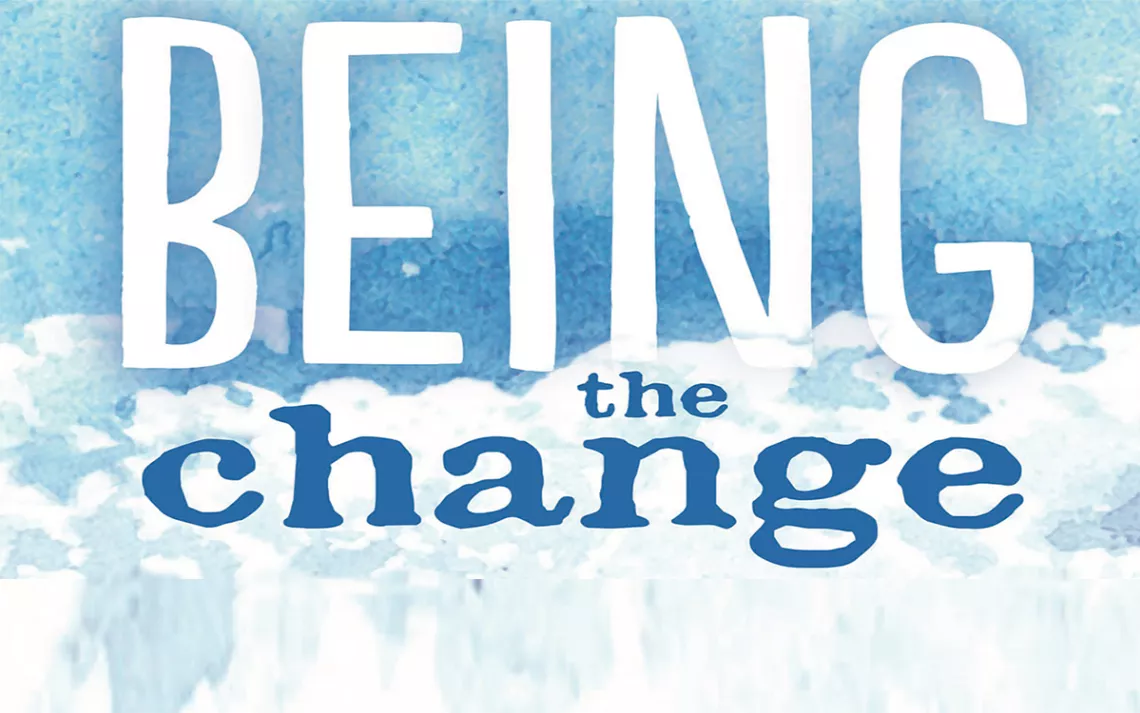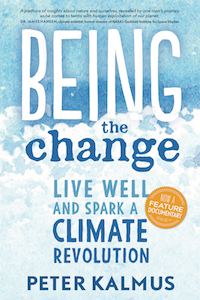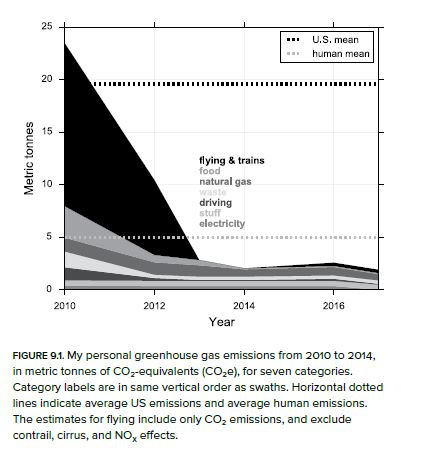Thoughts on Climate Action From a Scientist Who Gave Up Flying
Peter Kalmus says each of us can do something to address warming

This is an excerpt from the new book Being the Change: Live Well and Spark a Climate Revolution (New Society Publishers), by Peter Kalmus.
 Being the change is about transition. About going from being asleep to being awake. It’s a story that has one foot in industrial civilization and one foot in whatever is coming next.
Being the change is about transition. About going from being asleep to being awake. It’s a story that has one foot in industrial civilization and one foot in whatever is coming next.
Others have gone further: They are demonstrating that it’s possible to live without any money or fossil fuels at all, and to be happier as a result. On my own path, as I continue to reduce, I’m actually experiencing increasing abundance. It’s a good path.
As I keep walking on it, I get further from the core of industrial civilization. I’m heading toward its fringes. When I look back over my shoulder, what I’m walking away from looks pretty bad. It looks like we may have lost our way as a species. More and more, as I continue to walk, I’m able to see industrial civilization for what it was: an experiment or a phase that we had to go through, but that turned out not to work.
But now the results are in. Humans: let’s stop burning fossil fuels. Let’s stop killing each other and our planet. Let’s stop merely talking about love; let’s start practicing it. We have nothing to lose but our misery.
In order to embrace what’s coming next, I had to let go of what went before. My grief was like the leap of a trapeze artist, letting go of one trapeze, flying through space, and catching the next one. There were times when tears poured down. I mourned the world I’d known my whole life. I mourned my children’s future. I mourned how avoidable this all was. I mourned the strange and hard reality, and I mourned waking up. I mourned every blow struck in anger, and I mourned every bullet fired. I mourned all the species that are leaving us, never to return. I mourned this whole beautiful Earth.
But then, through these tears, I accepted reality as it is. Somehow, on the far side of the tears, I found the strength to go forward. Letting go has given me the space to imagine something new and better, a sea change. If you’re grieving, let the tears flow. And when the tears finally stop, look around. You will see then that there are miracles all around you. And you will be inspired to work harder than you ever thought possible.
Let’s work to build a world where everyone puts others above self and where we live aligned with the biosphere. In such a world, there is no war, crime, hatred, or negativity. Fundamentally, what’s impossible about this vision? What law of physics does it break? I need to spend my time doing something while I’m here on this planet, and it might as well be to work toward this. And the place to start is with me.
I hope you’ll join me. We can build this new world together. We can begin by observing our own selves by way of everyday physical sensations. We can begin by riding a bicycle. I don’t know how it’s all going to turn out, but I have hope.
As we wake ourselves up, we also wake each other up. It’s a mistake to assume we can’t do this. We can—if we choose to.
Aligning with the biosphere
The changes I’ve been making to my own life are simple, but they go far beyond recycling or green consumerism. I came to see that the business-as-usual ways of industrial society are bankrupt. So I actively replace those parts of my everyday life that feel unsatisfying with new ways of living that I do find satisfying.
Such changes don’t require sacrifice so much as exchange, swapping daily actions that aren’t satisfying for ones that are. In this way, my everyday life has gradually come into harmony with my beliefs. My experience has been that congruence between outer and inner life is the key to happiness. I’m no good at fooling myself.
I also came to see how deeply I’d been influenced by the subconscious whisper of culture, how little I questioned my everyday actions, and how completely I accepted the illusion that the way things are is the only way they could be. My old mindset was separation; my emerging mindset is connection. I’m learning that acceptance and detached observation of my own mind is the basis of compassion. I’m learning how to become sustainable, internally.
We could coin a word for this path of inner and outer change: becycling, beyond recycling. Becycling entails restoring cyclical natural processes at the local scale. It requires getting busy instead of passively hoping that ““they will think of something.” It means accepting responsibility for your own everyday actions and changing those that harm other beings in our planet’s biosphere. It means actually being the change.
Straightforwardness
My path is straightforward: if fossil fuels cause global warming, and I don’t want global warming, then I should reduce my fossil fuel use.
Similarly, if I don’t like conflict, killing, and wars, then I should reduce my own addiction to anger and negativity. This seems obvious to me now, but it didn’t always. My need to be right used to be blindingly strong, and fear and defensiveness led me to react to anger with more anger, to negativity with more negativity. If we say we want a world without wars, then we shouldn’t add hostility to the world ourselves! Yet wherever I go I see people arguing, fighting, and spreading negativity.
In our society, this kind of straightforwardness is often dismissed as idealistic, impractical, and out of reach. But my own direct experience says that it is possible to drastically reduce my fossil fuel use, and that it is possible to come out of conflict and negativity. What’s more, the personal rewards for doing both are tremendous: a less stressful, more satisfying life.
These two seemingly disparate things—reducing my own fossil fuel use and increasing my ability to love—are actually intimately interconnected. As I learn how to love more, it becomes increasingly clear that I am connected to everything. How, then, can I voluntarily harm the rest of the life on this planet? How can I harm the children who will be born 100 years from now? When someone else suffers, I also suffer. There is no separation between me and the rest of the life on this planet.
To be clear: I’m not saying that selfless love is the near-term answer to global warming. Unfortunately, there are many who, for whatever reason, will never strive to love selflessly; there’s no time to wait for them. And even for those who do so strive, it’s a long path. This is why we also need sensible policies and technologies that result in cheaper alternatives to fossil fuels.
But for those who are ready to walk on the straightforward path, the path of love, it’s certainly worth doing. It may even help to hasten the sensible collective action we desperately need.

Why walk on this path?
I’m aware that the changes I’m making to my daily life will not solve global warming or stave off global economic collapse. How could they? We’re rapidly approaching eight billion people on the planet, and I am only one of them.
However, my actions do make me happier, and that’s reason enough to do them. I also suspect that, for most of us, individual and local-scale actions are the most skillful means to effect global-scale change. This is a paradox of scale. Our individual actions don’t make much of an immediate difference in the global response to our predicament, but they are pieces in a vast puzzle. As more pieces get added, more people will get excited by the emerging picture and begin to add their own pieces.
The prevailing mindset in our industrial society is to search for a silver bullet solution, some brilliant techno-fix that allows us to avoid personal change (which is assumed to be undesirable). After decades of searching by the world’s brightest minds, however, it seems likely that there is no such silver bullet. Personal change will therefore likely be necessary. Here are the reasons I’m an early adopter of personal change:
It’s enjoyable
In my experience, cutting back on burning fossil fuels became possible—easy, even—when I began to realize that I enjoy my life more when I live mindfully and burn less. I realized that I don’t want to burn so much, and I don’t need to burn so much. And I genuinely enjoy the changes I’ve made, such as biking and gardening.
It’s empowering
Back when I was concerned about global warming but still burning lots of fossil fuels, I was suffering from cognitive dissonance, living inconsistently. This made me feel depressed and confused. Now I live in a more consistent way, which is empowering. It’s the key to connecting with others: my life is my calling card.
I want to help others, not harm them
Burning fossil fuels warms the planet, which harms others. It’s that simple. Although the processes involved are distributed globally, accrue over decades, and are statistical in nature—and therefore difficult for our brains to connect directly back to our individual actions—the harm is nonetheless real.
Burning fossil fuels should be unacceptable socially, the way physical assault is unacceptable. The harm it does is less immediate, but just as real. We need to start speaking this truth—burning fossil fuels harms others—so that society can begin realizing it.
It leads to connection and gratitude
Living with less fossil fuels leads to more connection with the land and with my community. It leads to increased awareness that food, water, fuel, and friends are precious. This connection and gratitude makes me happy.
Small actions lead to larger actions
We need to use our unique talents and interests to make a difference, and changing ourselves can reveal how to do this. Small actions gradually led me to two major actions that might have some impact beyond my local community: becoming an Earth scientist and writing this book. These efforts of mine may have larger impact, or they may not. Either way I’ll keep making simple changes to my life, while simultaneously looking for opportunities to catalyze collective change.
I’ve known passionate environmentalists who dreamed of “saving the planet” but who weren’t willing to begin changing themselves. But how can we reasonably expect to contribute meaningfully in the larger arena if we can’t be bothered to make small changes to our daily lives? If I want to contribute to a change in the narrative, I must begin with myself.
It demonstrates a new story
Few people in the United States realize that it’s possible to live without fossil fuels. This is a huge failure of imagination. By changing ourselves, we demonstrate what’s possible. We explore the new story, and we tell it.
Cynicism and inaction at the national level is nothing more than the collective expression of cynicism and inaction of individuals. When enough of us change ourselves, large-scale change is bound to happen. And when it comes to global warming, our actions speak louder than our words.
It’s meaningful
Meaningful work is a great joy. And what could be more meaningful than exploring a new way for humanity to live, in harmony with the biosphere?
As Gandhi wrote: “We but mirror the world. All the tendencies present in the outer world are to be found in the world of our body. If we could change ourselves, the tendencies in the world would also change. As a man changes his own nature, so does the attitude of the world change toward him. This is the divine mystery supreme. A wonderful thing it is and the source of our happiness. We need not wait to see what others do.”
Limits, patience, and grief
When I say that I can’t save the world, and that I’m aware I have limits, climate activists often misunderstand. They say that I need to stay optimistic, and that I won’t inspire anyone by talking about my limits. When they tell me this, I realize that they’re operating from one story, and I’m operating from another.
I know that I can change the world; indeed, I am changing the world. What I can’t do is save it.
That I have limits is a fact, and I accept it. I don’t expect my changes to have a big impact. (I don’t expect anything, actually.) If what I do has impact, I know this impact arises only from an existing resonance, a resonance that grows through interacting with many other people in turn. We are like water molecules in a wave: we simultaneously transmit the wave and are moved by it. No one water molecule causes the wave, but together an enormous number of water molecules carry the wave. It’s all of us together, carried by a resonance that will effect great change.
In other words, I operate from the story of the wave, not the story of the hero.
 The Magazine of The Sierra Club
The Magazine of The Sierra Club



